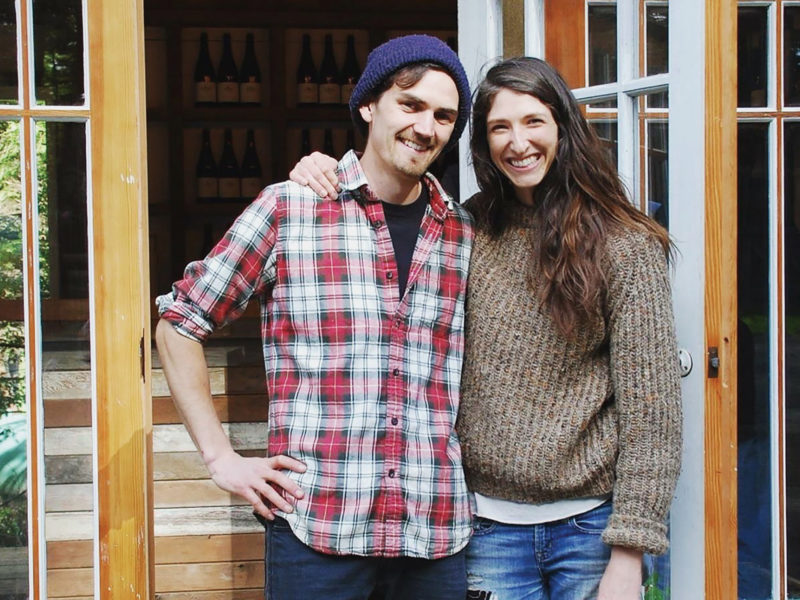PENDER ISLAND – Katie Selbee and Matthew Vasilev of Twin Island Cider on Pender Island have a business as unique and authentic as the cider they produce, taking apples from century-old orchards on the Gulf Islands and fermenting them traditionally with naturally occurring yeasts in their farm-based cidery. They started just four years ago after three years of planning and preparation.
“It is a shared dream, and a more viable option than starting a veggie farm,” says Vasilev.
Selbee is a graduate of the UBC Farm Practicum in Sustainable Agriculture. She followed it with a year growing mixed vegetables on an urban farm with other program graduates, running the farm’s CSA (community- supported agriculture) program. She also completed an orchard internship at UBC Farm.
It was at UBC Farm where the two met. Vasilev had experience making cider and had also worked in organic farming and food distribution in both Montreal and Vancouver.
“We were both drawn to the close-knit community and the social and environmental justice aspects of small organic farming,” says Selbee.
They toured cideries in BC, Washington and the UK. They talked to cider makers. They also started making cider from the Vasilev family’s orchard on Pender Island. They preferred the traditional style of natural fermentation.
“The traditional, or hobby style, is the best cider in the world,” says Vasilev.
They realized that the way they wanted to make cider, however, was labour intensive and risky.
“It is hard to scale up, but it is authentic,” explains Vasilev, “You have to do it yourself. Use simple tools and simple methods.”
The pair soon partnered with cider-lovers Sandra MacPherson and Noel Hall who had recently purchased farmland with a neglected old homestead and orchard on Pender Island.
“Within three months, we were rolling,” says Vasilev. “We were starting from the ground up, every skill, every aspect.”
They learned from the orchard and cider community, making valuable contacts, and learning the necessary skills. They collected scion wood of cider apple varieties from various sources.
Year zero was all about grafting and planting 1,300 cider-variety trees, including Yarlington Mill, Dabinett and Chisel Jersey for a two-acre orchard, and rehabilitating heritage orchards. The first cider batches were blends of Gulf Island and Okanagan apples with a goal of 7,000 litres.
They soon honed their skills to harvest and process 32,000 pounds of fruit from 30 orchards. Last year, 60,000 pounds of fruit from 48 properties on North and South Pender, Mayne and Saturna islands were harvested. Vasilev estimates the fruit included 70 to 100 varieties of apples.
Seventeen orchards were pruned last year. This valuable service alone has given Selbee and Vasilev access to a range of orchards for each harvest. The under-utilized old orchards have also received a fresh purpose.
“The older trees that have been neglected produce more phenolics, which is important in cider quality,” says Vasilev. “They are dry farmed, which is a great legacy.”
Total control
Every aspect of production, marketing and sales is kept in-house. They work to keep it enjoyable, small and creative.
“We do all the milling/pressing ourselves at the cidery with the help of family and a couple of part-time helpers,” says Selbee. “We use a traditional rack and cloth press. It’s very labour and time-intensive but worth the amount of control it gives us over the final product.”
“There is no slow time; we work year-round and do it all,” says Vasilev.
This attention to detail and hands-on approach to the work has made it a challenge to stay on top of the two-acre orchard they originally planted. The leases of the old orchards have distracted them, and the new trees struggled with a canker and a less-than-perfect site. This year, the plan is to expand with more two-year old trees in a sunnier spot.
But it is perhaps their non-farming skills that give them the edge: Vasilev has a degree in history from McGill, and Selbee graduated in honours English from UBC, and she is a talented artist as well. These skills have brought the historical importance of the land, traditional fermentation methods, and heritage orchards to the forefront.
“It’s neat to do everything in-house from harvesting to bottling to design,” says Selbee.
They have a large garden, and last year used their garage to host a farm store for the Pender Growers Collective, a group of small-scale and backyard growers.
“Our values are embedded in what we do,” says Vasilev.
Vasilev credits Selbee with pushing new ideas, such as presenting cider like wine which can command a higher price.
They are looking for ways to diversify into related products such as apple cider vinegar, but they also want to maintain their authenticity.
Plans have been tempered by COVID-19, but some changes made last fall made the shift easier. A cider club sends subscribers a shipment of selected batches of cider to their door, and the online ordering system has been useful with the tasting room closed.
“We used to have 50% to 60% of our sales from the tasting room, and it has been closed three months now,” says Vasilev. “COVID has strengthened our customer base. It boosted online sales.”
The other 50% of sales is from restaurant and liquor stores. Both have decreased as well during the pandemic, but Vasilev remains optimistic. They are lucky, he says, because alcohol remains in high demand even in times of crisis.
Like many small businesses, Twin Island Cider applied for and received a $40,000 loan from the Canada Emergency Business Account but it was not eligible for funding under the Canada Emergency Wage Subsidy.


 Pandemic highlights SAWP improvements
Pandemic highlights SAWP improvements